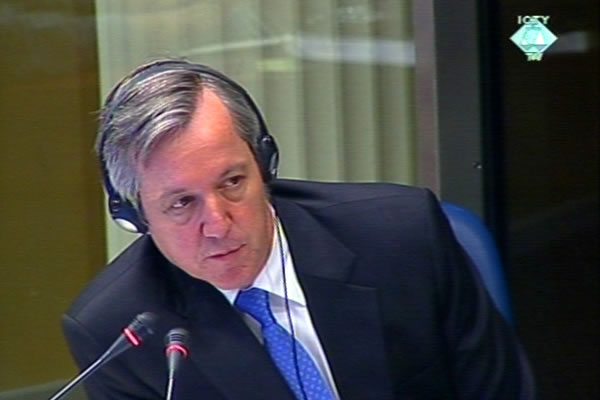Home
KARADZIC BLAMES MUSLIM PROPAGANDA
NATO air strikes against Serb targets in the summer of 1994 were a result of ‘Muslim war propaganda’, Radovan Karadzic contends as he continues his cross-examination of Anthony Banbury. In 1994 and 1995, Banbury first served as political advisor to Victor Andreev, UN civil affairs officer in Sarajevo, and then to Yasushi Akashi, special envoy of the UN Secretary-General to the former Yugoslavia
 Anthony Banbury, witness at the Radovan Karadzic trial
Anthony Banbury, witness at the Radovan Karadzic trial Radovan Karadzic continued the cross-examination of Anthony Banbury, currently United Nations assistant Secretary-General for field support. Karadzic brought up the crisis in Gorazde in April 1994, noting that the information about the shelling of the town and civilian casualties was ‘vastly exaggerated’. According to Karadzic, this was in fact an integral part of the ‘Muslim war propaganda’ that broadcast ‘lies’. According to Karadzic, this influenced UNPROFOR’s decision to call in NATO air strikes to target Serb positions.
Karadzic corroborated this claim with the words of General Michael Rose who said that the images of Gorazde as a town in ruins, published in the world media, in fact depicted houses, left empty after Muslims expelled Serbs in 1992. Karadzic also brought up an order issued by General Mladic, prohibiting the destruction and burning of houses and demanding that civilian population be protected. As the order notes, the ‘Muslim propaganda is disseminating misinformation’ to the effect that the ‘VRS has begun an all-out effort to exterminate Muslims’; this was done to ‘vilify the Republika Srpska’.
Commenting on General Rose’s remarks, Banbury said that in April 1994 it was difficult to obtain reliable information about the situation in Gorazde because of constant fighting and restricted freedom of movement. However, the UN’s ‘general understanding’ of the situation in the town remained unchanged even after they received more information, Banbury said. As for Mladic’s order, Banbury explained that the UN mission ‘didn’t rely so much on documents as on the behavior’ of the sides in the conflict. Banbury rejected Karadzic’s claim that the withdrawal of the Serb forces from around Gorazde in May 1994 was an ‘act of good will’ by the VRS.
In his effort to prove that the enemy side was responsible for the outbreak of the conflict, Karadzic showed a report of General Bertrand De Lapresle to the chief of UN peace-keeping operations Kofi Annan. In the report, De Lapresle blamed the Bosnian side for the armed incidents in the Gorazde area. The accused asked the witness if the French general ‘instilled confidence’ in him. ‘Not quite’, the witness shot back readily.
Invoking the Geneva Conventions, Karadzic argued that Serbs ‘had the right’ to set the terms for the movement of humanitarian convoys over their territory and they had good reason to stop them every time they did so. The witness begged to differ, saying that the Security Council demanded full freedom of movement for humanitarian convoys. Banbury also rejected Karadzic’s explanation that Serbs had the right to stop convoys and seize food and other items because parts of those shipments allegedly ended up on the black market.
Karadzic also mentioned a meeting in Pale on 6 July 1995 when Nikola Koljevic expressed his concern over the humanitarian crisis to the UN representatives. Banbury replied that in his view ‘Serbs were never sincerely concerned’, prompting Karadzic to accuse Banbury of ‘anti-Serb attitudes’. The witness dismissed the accusation, saying he didn’t favor any side. Banbury sided with ‘UNPROFOR and the civilians’ who suffered because of the Serb side’s attitude to the humanitarian aid convoys.
Karadzic tried to prove that the Bosnian government ‘intimidated’ the UN staff. In mid-July 1995, the Bosnian government demanded that UN civil affairs coordinator Philip Corwin leave BH immediately. As Karadzic contended, Corwin ‘had a bad reputation’ because he openly criticized ‘the Muslim side’. What was at issue here was whether UNPROFOR officials behaved impartially, appropriately and objectively, Banbury explained, and in his opinion Corwin’s conduct was ‘unbecoming of a UN official’.
Karadzic will complete his cross-examination of Anthony Banbury tomorrow. After that, Nedjeljko Prstojevic, unwilling prosecution witness and war-time president of the Crisis Staff in the Ilidza municipality in Sarajevo will return to the witness stand.
Linked Reports
- Case : Karadzic
- 2011-03-15 AKASHI WAS ‘IRRESISTIBLE’, KARADZIC ‘TOLERANT’
- 2011-03-11 RAPE VICTIM: I WILL WAIT PATIENTLY FOR JUSTICE
- 2011-03-10 RAPE UNSUITABLE FOR POLICE REPORT
- 2011-03-17 UNPROFOR CONSIDERED TARGETING BH ARMY POSITIONS
- 2011-03-18 PRSTOJEVIC AND KARADZIC AGREE ON EVERYTHING
- 2011-03-21 ‘RUMORS AND GOSSIP’ ABOUT THE EXPULSIONS OF MUSLIMS
